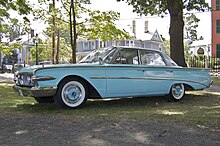Edsel

Founded: November 19, 1956; 66 years ago
Defunct: November 19, 1959; 63 years ago
Headquarters: Allen Park, Michigan, US
Products:
Full-size: Citation, Corsair, Pacer, Ranger
Station wagon: Bermuda, Villager, Roundup
Parent: Ford Motor Company

1958 Edsel Corsair
Edsel is an automobile marque that was planned, developed, and manufactured by the Ford Motor Company for model years 1958 through 1960. With the Edsel brand, Ford had expected to make significant inroads into the market share of both General Motors and Chrysler and close the gap between itself and GM in the domestic American automotive market. Ford invested heavily in a yearlong teaser campaign leading consumers to believe that Edsels were the cars of the future – an expectation they failed to meet. After being unveiled to the public, they were considered to be unattractive, overpriced, and overhyped. Edsels never gained popularity with contemporary American car buyers and sold poorly. The Ford Motor Company lost $250 million on Edsel development, manufacturing, and marketing.
The very name "Edsel" became a popular symbol for a commercial failure.
{snip}
History
{snip}
Discontinuation

1960 Edsel Ranger sedan
Ford announced the end of the Edsel program on November 19, 1959. However, production continued until late in November, with the final tally of 2,846 model year 1960 cars. Total Edsel sales were approximately 116,000, less than half the company's projected break-even point. The company lost $350 million, or the equivalent of $2.4 billion in 2018 dollars, on the venture. Only 118,287 Edsels were built, including 7,440 produced in Ontario, Canada. By U.S. auto industry standards, these production figures were dismal, particularly when spread across a run of three model years.
On Friday, November 20, United Press International's (UPI) wire service reported that book values for used Edsels had declined by as much as $400 based on condition and age immediately following the Ford press release. In some newspaper markets, dealers scrambled to renegotiate newspaper advertising contracts involving the 1960 Edsel models, while others dropped the name from their dealerships' advertising entirely. Ford issued a statement that it would distribute coupons to customers who purchased 1960 models (and carryover 1959 models) prior to the announcement, valued at $300 to $400 toward the purchase of new Ford products to offset the decreased values. The company also issued credits to dealers for stock unsold or received following the announcement.
Edsel's failure
Historians have advanced several theories in an effort to explain Edsel's failure. Popular culture often faults vehicle styling. Consumer Reports has alleged that poor workmanship was Edsel's chief problem. Marketing experts hold Edsels up as a supreme example of the corporate culture's failure to understand American consumers. Business analysts cite the weak internal support for the product inside Ford's executive offices. According to author and Edsel scholar Jan Deutsch, an Edsel was "the wrong car at the wrong time."
{snip}


